人教版八年级英语上册语法单词讲义
人教版八年级上册英语Unit 3知识点梳理及语法讲义(教师版)

八年级上册英语Unit 3知识点与语法精讲精练词汇梳理(一)完成单词梳理:名词:1. competition比赛;竞赛 2. mirror 镜子 3. kid 小孩;年轻人4. grade 成绩等级5. hand 手6. saying 谚语;格言7. heart 内心;心脏8. fact 现实;事实9. information 信息;消息10. arm 手臂;上肢动词:1. win 获胜;赢 2. care 在意;关心 3. should 应该;应当4. reach 伸手;到达5. touch 感动;触摸6. break 损坏7. share 分享;共享;共用副词:1. loudly 喧闹地;大声地;响亮地 2. quietly 轻声地;轻柔地;安静地3. clearly 清楚地;清晰地;明白地4. truly 真正;确实形容词:1. outgoing 爱交际的;友好的;外向的 2. hard-working工作努力的;辛勤的3. fantastic 极好的;了不起的4. talented 有才能的;有才干的5. serious 严肃的;稳重的6. necessary 必需的;必要的7. loud 响亮的;大声的8. similar 相像的;类似的9. primary 最初的;最早的兼类词:1. both (adj/pron)两个;两个都2. better (adj/adv)较好的(地);更好的(地)3. which (pron/adj)哪一个;哪一些4. though (adv)不过;可是;然而(conj)虽然;尽管;不过5. laugh (v)笑;发笑(n)笑声(二) 词汇变形小结:1. good/well (adj/adv. 好的) — better (比较级) — best (最高级)2. loud (adj. 大声的) — loudly (adv.喧闹地)3. quiet (adj. 安静的) — quietly (adv. 安静地)4. competition (n. 竞争;比赛) — compete (v. 竞争;比赛)5. clearly (adv. 清楚地;清晰地) — clear (adj. 清楚的;清晰的)6. win (v. 赢;获胜) — won (过去式) — winner (n. 获胜者)7. talented (adj. 有才能的) — talent (n. 才能;天赋)8. truly(adv. 真正;确实) — true (adj. 真正的) — truth (n. 真实;真相)9. care(v. 在意;关心) — careful (adj. 认真的;细心的)10. serious(adj. 严肃的;稳重的) — seriously (adv. 严重地;严肃地)11. say(v. 说) — saying (n. 谚语;格言)12. touch(v. 感动;触摸) — touching (adj. 令人感动的) — touched (adj. 感动的)13. break(v. 破坏) — broke (过去式)【练一练】用所给词的适当形式填空1.Class Six won (win) the basketball game but our class lost the game.2.My friend likes telling jokes. He often makes us laugh (laugh)happily.3.Be quiet (quietly)! I have something important to tell you.4.I think Linda dances better (well) than Kate.5.Students can’t speak loudly (loud) in the library.6.Although he is only two years old, he can speak clearly (clear).7.The teacher told us to find out some information (information)about our country and share it next week.8.I’m truly (true) sorry that things had to end like this.st night we saw a movie and it made us touched (touch).10.I don't think differences (different) are important in a friendship.(三) 短语攻关:care about关心;在意be talented in 在……有天赋both...and...……和……都play the drums 敲鼓the singing competition 歌唱比赛be similar to 与……相像的bring out 使显现the same as 和……相同be different from与……不同as long as 只要in fact 事实上primary school 小学get good grades 取得好成绩have fun doing sth 做某事很开心make sb do sth 让某人做某事want to do sth 想要做某事make friends 交朋友be like 像……一样知识点梳理1.Both Sam and Tom can play the drums, but Sam plays them better than Tom. 萨姆和汤姆都会敲鼓,但是萨姆比汤姆敲得好。
人教版八年级英语上册《Unit-3I’m-more-outgoing-than-my-sister》讲义

讲义Unit 3 I’m more outgoing than my sister.Exercises:I.用括号内单词的适当形式填空。
1. Tom is _________ ( young ) than Peter, but ___________ (tall) than Peter.2. He comes to school a little____________ (early) than I/me.3. Mary is not as ___________ (serious) as Betty.4.Which is _____________ (heavy), a hen or a chicken?5.-- How _________ (tall) is Sally?-- She' s only 1.40 metres ________ (tall). She is much _________ (short) than Sally. She is also the _________ (short) girl in the class.6. He is _____________(friendly) than the others in the class, I think.7. A dictionary is much _________ ___________(expensive) than a story book.8.-- Annie plays the piano very ___________ (good).-- Sue plays it _____ (well) than Annie. And Sally plays it the __________ (well).9. Practise as __________ (much) as you can.10. Her mother is getting ____________(fat) and ________ (fat).II.根据汉语和所给提示翻译句子(每空不限词数)1.那个男孩比班上任何一个学生都高。
八年级英语人教版(上册)语法专讲-一般过去时和不定代词(附习题)
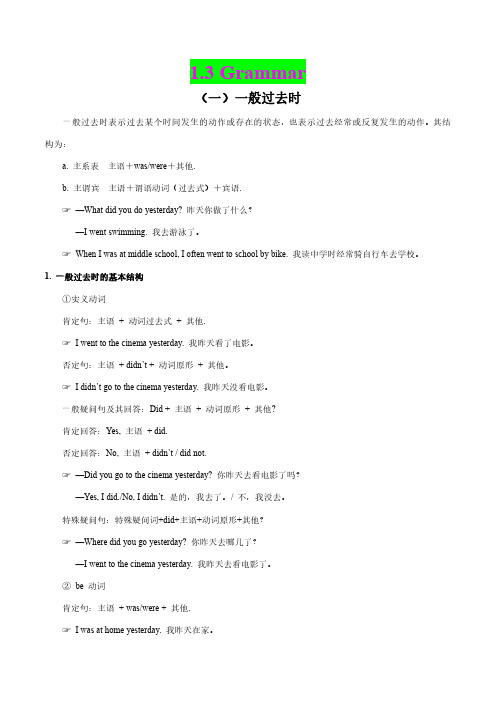
1.3Grammar(一)一般过去时一般过去时表示过去某个时间发生的动作或存在的状态,也表示过去经常或反复发生的动作。
其结构为:a.主系表主语+was/were+其他.b.主谓宾主语+谓语动词(过去式)+宾语.☞—What did you do yesterday?昨天你做了什么?—I went swimming.我去游泳了。
☞When I was at middle school,I often went to school by bike.我读中学时经常骑自行车去学校。
1.一般过去时的基本结构①实义动词肯定句:主语+动词过去式+其他.☞I went to the cinema yesterday.我昨天看了电影。
否定句:主语+didn’t+动词原形+其他。
☞I didn’t go to the cinema yesterday.我昨天没看电影。
一般疑问句及其回答:Did+主语+动词原形+其他?肯定回答:Yes,主语+did.否定回答:No,主语+didn’t/did not.☞—Did you go to the cinema yesterday?你昨天去看电影了吗?—Yes,I did./No,I didn’t.是的,我去了。
/不,我没去。
特殊疑问句:特殊疑问词+did+主语+动词原形+其他?☞—Where did you go yesterday?你昨天去哪儿了?—I went to the cinema yesterday.我昨天去看电影了。
②be动词肯定句:主语+was/were+其他.☞I was at home yesterday.我昨天在家。
否定句:主语+wasn’t/weren’t+其他.☞I wasn’t at home yesterday.我昨天没在家。
一般疑问句及其回答:Were/Was+主语+其他?☞—Were you at home yesterday?你昨天在家吗?—Yes,I was./No,I wasn’t.是的,我在家。
Unit5Grammarandwriting(学生版)八年级英语上册讲义(人教版)

Unit 5 Grammar and writing目标导航Grammar 动词不定式作宾语Writing 谈论自己喜欢的电影或电视节目知识精讲单元语法讲练:一、动词不定式知识点01 动词不定式的构成及用法构成动词不定式由“to+动词原形”构成,有时可以省略to.动词不定式在句中可作宾语、宾语补足语、状语、定语等。
动词不定式在句子中不作谓语,所以没有人称和数的变化,其否定式是在to前加上not.具体用法见下面:用法1作宾语。
(1)在offer,plan,hope,decide,learn,wish,want,agree,refuse,begin,start,forget,remember 等动词之后作宾语。
Finally he offered to go shopping with me.最后他主动提出跟我一起去购物。
I want to see a film tonight.我想今天晚上去看电影。
【即学即练1】Mario and his friends are making some plans in an old people's home this summer.A.workB.workingC.to work解析:考查非谓语动词。
Make plans to do sth.相当于plan to do sth,意为“计划做某事”。
答案C(2)在know,decide,remember 等动词之后可用“疑问词+动词不定式”作宾语。
I don't want to stay at home,but I don't know where to go.我不想待在家里,但是我不知道能去哪里。
【即学即练2】-My family will go on a trip to Beijing this summer, but we haven't decided .-Why not take the highspeed railway?A. when to leaveB.how to get thereC.which hotel to chooseD.how long to stay there解析:考查“疑问词+不定式”的用法。
Unit7单词讲解人教版八年级英语上册

1.paper ['peɪpər]o n. 纸;纸张o固定搭配:a piece of paper 一张纸o例句:Can you pass me the paper, please? 请把纸递给我好吗?2.pollution[pə'luːʃn]o n. 污染;污染物o固定搭配:air pollution 空气污染;water pollution 水污染o例句:The factory is causing serious pollution to the river. 这家工厂正在对河流造成严重污染。
3.prediction[prɪ'dɪkʃn]o n. 预言;预测o固定搭配:make a prediction 做出预测o例句:No one can make accurate predictions about the future.没有人能对未来做出准确的预测。
4.future ['fjuːtʃər]o n. 将来;未来o固定搭配:in the future 在将来o例句:What do you think the future will bring? 你认为未来会带来什么?5.pollute [pə'luːt]o v. 污染o固定搭配:pollute the environment 污染环境o例句:The chemicals from the factory are polluting the river.工厂排放的化学物质正在污染河流。
6.environment[ɪn'vaɪrənmənt]o n. 环境o固定搭配:protect the environment 保护环境o例句:It's our responsibility to care for the environment. 保护环境是我们的责任。
7.planet['plænɪt]o n. 行星o固定搭配:the planets of the solar system 太阳系行星o例句:The Earth is the third planet from the Sun. 地球是距离太阳第三近的行星。
Unit2单词知识点讲义人教版英语八年级上册

2023年人教版初中英语八年级上册Unit 2单词知识点讲解(讲义)1 houseworkn.【u】家务事;家务劳动do the houseworkHousework is a never-ending task.She always helps with the housework.2 hardlyadv.几乎不,几乎没有There is hardly any tea in the bottle.We hardly know each other.用于can或者could后表示很难I can hardly keep my eyes open.我都快睁不开眼了。
同义词seldom几乎不3 everadv.从来;任何时候(否定句,疑问句和if引导的句子)Nothing ever happens here.这儿几乎没发生过任何事。
adv.总是;曾经It was raining harder than ever.当下下着前所未有的大雨。
4 hardly ever表示频率非常低,几乎不会发生I hardly ever go to concerts.I hardly ever eat fish.She hardly ever exercises.5 onceadv.一次;仅一次I’ve only been there once.我只去过那里一次。
She cleans his car once a week.她一个周洗一次车。
adv.曾经I once met your mother.The book was once famous, but nobody reads it today.conj. 一旦The water is fine once you’re in.你一旦下了水,就觉得水里很舒服。
at once 立刻;马上once again再一次once more 又一次;再一次once upon a time 从前;很久以前6 twiceadv.两次They go there twice a month.adv.两倍Cats sleeps twice as much as people.猫睡觉的时间比人长一倍。
八年级英语(人教版)上册重点语法知识点

八年级上册重点语法知识点1. 感叹句:感叹句是用来表达喜怒哀乐等强烈情感的句子。
感叹句一般用how或者what开头,句末加感叹号。
what修饰名词,how修饰形容词或副词。
具体句式如下:(1)what引导的感叹句:1)What a(an)+形容词+可数名词的单数形式+主语+谓语!What a clever boy he is!多么聪明的小男孩啊!2)What+形容词+可数名词的复数形式+主语+谓语!What interesting books the children are reading! 孩子们读的书多么有趣啊!3)What+形容词+不可数名词+主语+谓语!What cold weather it is!多冷的天!(2)how引导的感叹句:1)How+形容词或副词+主语+谓语!How lovely the baby is!这孩子真可爱!(lovely为形容词)How fast he runs! 他跑地多快啊!(fast为副词)2)How+形容词+a(an)+可数名词的单数形式+主语+谓语!How heavy a box they are carrying! 他们抬的箱子多重啊!3)How+主语+谓语!How time flies! 时间过得多快!( ) 1. interesting job this is!A.WhatB.HowC.What anD.How an( ) 2. Mo Yan won the Nobel Prize for Literature last year. _______excellent he is!A. HowB. WhatC. What aD. What an( ) 3. ---______day it is!--- Let’s go out and enjoy the sunshine!A. What a lovelyB. How windyC. What a rainyD. How lovely( ) 4. ______ terrible weather we had last Sunday!A. WhatB. What aC.HowD. How a( ) 5. ______useful the book is! We can know well about the city from it.A. WhatB. What aC. HowD. What an( ) 6. _____great picture! Who painted it?A. HowB. WhatC. How aD. What a( ) 7. ______ a beautiful car! I’ve never seen it before.A. WhatB. WhichC.HowD.Whether2. How oftenhow often意为“多久一次”,常用于对时间频率的提问。
人教版八年级上册英语Unit 4知识点梳理及语法讲义(教师版)
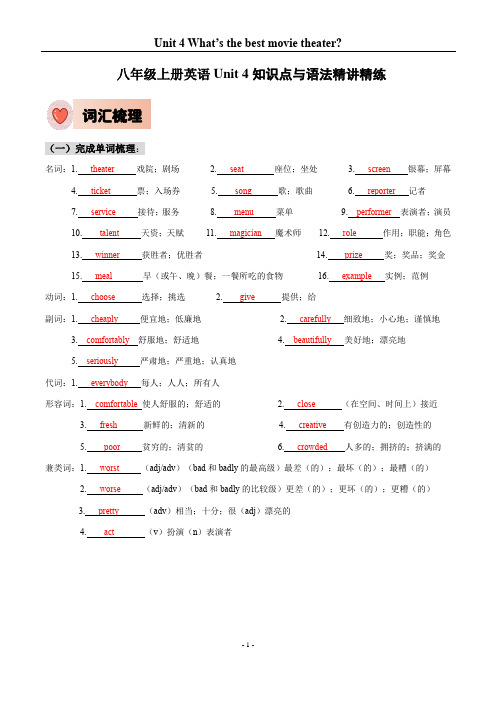
八年级上册英语Unit 4知识点与语法精讲精练词汇梳理(一)完成单词梳理:名词:1. theater 戏院;剧场 2. seat 座位;坐处 3. screen 银幕;屏幕4. ticket 票;入场券5. song 歌;歌曲6. reporter 记者7. service 接待;服务8. menu 菜单9. performer 表演者;演员10. talent 天资;天赋11. magician 魔术师12. role 作用;职能;角色13. winner 获胜者;优胜者14. prize 奖;奖品;奖金15. meal 早(或午、晚)餐;一餐所吃的食物16. example 实例;范例动词:1. choose 选择;挑选 2. give 提供;给副词:1. cheaply 便宜地;低廉地 2. carefully 细致地;小心地;谨慎地3. comfortably 舒服地;舒适地4. beautifully 美好地;漂亮地5. seriously 严肃地;严重地;认真地代词:1. everybody 每人;人人;所有人形容词:1. comfortable 使人舒服的;舒适的 2. close (在空间、时间上)接近3. fresh 新鲜的;清新的4. creative 有创造力的;创造性的5. poor 贫穷的;清贫的6. crowded 人多的;拥挤的;挤满的兼类词:1. worst (adj/adv)(bad和badly的最高级)最差(的);最坏(的);最糟(的)2. worse (adj/adv)(bad和badly的比较级)更差(的);更坏(的);更糟(的)3. pretty (adv)相当;十分;很(adj)漂亮的4. act (v)扮演(n)表演者(二) 词汇变形小结:1. comfortable (adj. 使人舒服的) — comfortably (adv. 舒适地) — uncomfortable (反义词:不舒服的) — uncomfortably (反义词:不舒服地)2. bad/badly (adj/adv. 糟糕的;糟糕地) — worse (比较级) — worst (最高级)3. cheaply (adv. 便宜地) — cheap (adj. 便宜的)4. choose (v. 选择) — chose (过去式) — choice (n. 选择)5. carefully (adv. 小心地) — careful (adj. 小心的) — careless (反义词:粗心地) — carelessly (反义词:粗心的)6. report (v. 报告) — reporter (n. 记者)7. act (v. 扮演) — actor (n. 演员) — action (n. 动作;行动)8. creative(adj. 有创造力的) — create (v. 创造)9. talent(n. 天资;天赋) — talented (adj. 有才能的)10. magician(n. 魔术师) — magic (adj/n. 有魔力的;魔术)11. beautifully(adv. 漂亮地) — beautiful (adj. 漂亮的)12. winner(n. 获胜者) — win (v. 赢;赢得)13. service(n. 接待;服务) — serve (v. 服务;接待)14. performer(n. 表演者;演员) — perform (v. 表演)15. seriously(adv. 严重地) — serious (adj. 严肃的)16. give(v. 提供;给) — gave (过去式)【练一练】用所给词的适当形式填空1.Let’s go to Danny’s. The food there is cheapest(cheap)in town.2.I like the movie theater Movie Palace best because I can sit comfortably(comfortable).3.The radio station Oldies 102.1FM is pretty bad. It’s___worse___(bad)than All Talk 970AM.4.His brother is a __reporter__ (report).5.It’s time for class. The students should take their ___seats___ (seat).6.Her friend wants to be a performer (perform) when she grows up.7.I think Liu Qian is the most exciting magician (magic).8.You must take this English test seriously (serious).9.The winner (win) is an 8-year-old girl in the dancing competition.10.Who can sing songs the most beautifully (beautiful) in your family?(三) 短语攻关:close to 离……近so far到目前为止no problem 没问题talent show 才艺表演around the world 世界各地look for 寻找all kinds of 各种各样的have...in common 有相同特征be up to 是……的职责;由……决定play a role 发挥作用;有影响make up 编造(故事、谎言等)for example 例如take...seriously 认真对待……come true 实现thanks for... 因……而感谢thanks to 幸亏;多亏1.Thanks for telling me. 谢谢你告诉我。
人教版八年级上册英语 Unit 1 词汇和语法基础(解析版)

知识图谱Unit 1 Where did you go on vacation?知识精讲一、必背词汇anyone [‘eniwʌn] pron.任何人anywhere [‘eniweə(r)] adv.任何地方n.任何(一个)地方wonderful [‘wʌndəfl] adj.精彩的;极好的few [fjuː] adj.很少的;n.少量most [məʊst] adj.最多的;大多数的;something [‘sʌmθɪŋ] pron.某事物;nothing(=not…anything) [‘nʌθɪŋ]pron.没有什么n.没有everyone [‘evriwʌn] pron.每人;人人myself [maɪ’self] pron.我自己yourself [jɔː’self] pron.你自己;你亲自hen [hen] n.母鸡;雌禽pig n.猪seem [siːm] vi.似乎;好像bored [bɔːd] adj.无聊的;厌烦的;郁闷的someone [‘sʌmwʌn] pron.某人;有人diary [‘daɪəri] n.日记;日记簿activity [æk’tɪvəti] n.活动;活跃paragliding [‘pærəɡlaɪdɪŋ] n.空中滑翔跳伞feel like(doing sth.)想要bird [bɜːd] n.鸟;禽bicycle [‘baɪsɪkl] n.自行车building [‘bɪldɪŋ] n.建筑物trader [‘treɪdə(r)] n.商人;商船wonder [‘wʌndə(r)] v.惊奇;想知道;怀疑difference [‘dɪfrəns] n.差异;不同top [tɒp] n.顶部;顶wait [weɪt] v.等;等待(wait for)umbrella [ʌm’brelə] n.伞;雨伞wet [wet] adj.湿的;雨天的below [bɪ’ləʊ] prep.低于;在...下面adv.在下面enough [ɪ’nʌf] adj.足够的adv.足够地;充分地hungry(反full) [‘hʌŋɡri] adj.饥饿的;渴望的as [əz] conj.如同;像...一样hill美[hɪl] n. 小山;丘陵;斜坡;山冈duck [dʌk] n.鸭肉;鸭dislike [dɪs’laɪk] v./ n. 不喜欢;厌恶Central Park 中央公园Huangguoshu waterfall 黄果树瀑布Hangkong H.K. 香港Malaysia 马来西亚Georgetown 圭亚那乔治敦港口,美国乔治城大学Weld Quay街(海乾街/码头) 位于马来西亚槟城岛(州),乔治市Penang Hill 马来西亚槟榔山(升旗山)tian’anmen square天安门广场the Palace Museum 故宫博物院二、重点词汇1. wonderful adjective /ˈwʌn.də.fəl/extremely good绝妙的,令人惊叹的,极好的1). He’s a wonderful cook.他是个非常出色的厨师。
人教版八年级上册英语Unit 8 知识点语法归纳总结

人教版八年级上册英语Unit 8 知识点语法归纳总结一、过去进行时(Past Continuous Tense)过去进行时用于表示过去某一时刻或某段时间正在进行的动作或状态。
1. 构成肯定句:主语 + was/were + 动词的ing形式否定句:主语 + was/were not + 动词的ing形式一般疑问句:Was/Were + 主语 + 动词的ing形式?肯定回答:Yes, 主语 + was/were.否定回答:No, 主语 + wasn't/weren't.2. 使用场景过去进行时常用于以下场景:- 表示过去某一时刻正在进行的动作- She was cooking dinner when I arrived. (我到达的时候,她正在做晚饭。
)- 表示过去某一段时间内持续进行的动作- They were playing basketball all afternoon. (他们整个下午都在打篮球。
)- 表示过去两个同时进行的动作- While he was studying, I was watching TV. (他在研究的时候,我正在看电视。
)二、过去完成时(Past Perfect Tense)过去完成时用于表示在过去某一时间或动作之前已经发生的动作或状态。
1. 构成肯定句:主语 + had + 过去分词否定句:主语 + hadn't + 过去分词一般疑问句:Had + 主语 + 过去分词?肯定回答:Yes, 主语 + had.否定回答:No, 主语 + hadn't.2. 使用场景过去完成时常用于以下场景:- 表示在过去某一时间或动作之前已经发生的动作- They had already left when I arrived. (当我到达时,他们已经离开了。
)- 表示过去某一时间之前已经完成的动作- She had finished her homework before dinner. (她在晚饭之前已经完成了作业。
人教版八年级上册英语Unit 2知识点梳理及语法讲义(学生版)
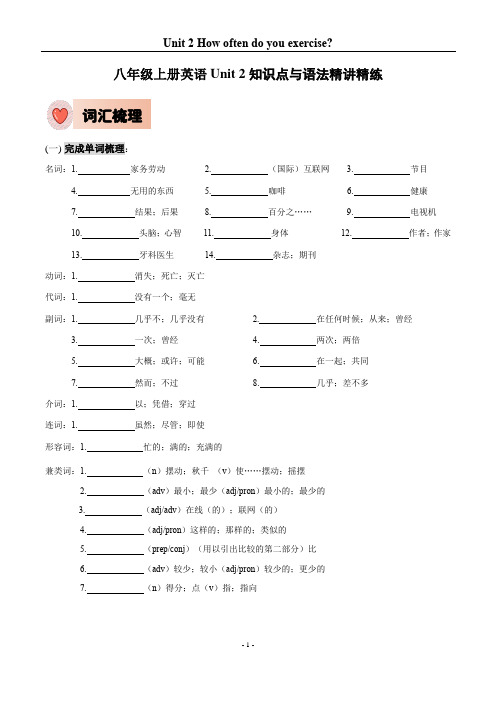
八年级上册英语Unit 2知识点与语法精讲精练词汇梳理(一)完成单词梳理:名词:1. 家务劳动 2. (国际)互联网 3. 节目4. 无用的东西5. 咖啡6. 健康7. 结果;后果8. 百分之……9. 电视机10. 头脑;心智11. 身体12. 作者;作家13. 牙科医生14. 杂志;期刊动词:1. 消失;死亡;灭亡代词:1. 没有一个;毫无副词:1. 几乎不;几乎没有 2. 在任何时候;从来;曾经3. 一次;曾经4. 两次;两倍5. 大概;或许;可能6. 在一起;共同7. 然而;不过8. 几乎;差不多介词:1. 以;凭借;穿过连词:1. 虽然;尽管;即使形容词:1. 忙的;满的;充满的兼类词:1. (n)摆动;秋千(v)使……摆动;摇摆2. (adv)最小;最少(adj/pron)最小的;最少的3. (adj/adv)在线(的);联网(的)4. (adj/pron)这样的;那样的;类似的5. (prep/conj)(用以引出比较的第二部分)比6. (adv)较少;较小(adj/pron)较少的;更少的7. (n)得分;点(v)指;指向(二) 词汇变形小结:1. one (num. 一) — (adv. 一次) — (第一)2. two (num. 二) — (adv.两次)— (第二)3. swing (v. 使……摆动) — (过去式)4. little (adj. 少的) — (比较级:更少的) — (最高级:最少的)5. health (n. 健康) — (adj. 健康的) — (adv. 健康地)— (反义词:不健康的) — (反义词:不健康地)6. die (v. 死) — (n. 死亡) — (adj. 垂死的) — (adj. 死的)7. write (v. 写) — (n. 作者;作家)【练一练】用所给词的适当形式填空1.Most parents don’t think it is ______________(health)for children to stay up too late at night.o She is a great ______________(write)and he’s especially famous for his play, Teahouse.3.If people don’t exercise, the illness can go into their ______________ (body) easily.4.It takes ______________(little)time to go there by underground than by bus.5.Jim got ten ______________ (point)in the basketball match.6.Take the medicine______________(two) a day, and you’ll feel better.7.Jack ______________(do) his homework every day.8.Mr. Li______________(teach) English in our school five years ago.9.At______________(little)ten students were late for school this morning.10.Many boys like playing football because they think it’s______________(relax).(三) 短语攻关:在周末上网几乎从不多久一次一周一次一周两次一周四到六次使用互联网去看电影熬夜至少对……有好处做运动打网球在某人的空闲时间去看牙医摇摆舞做家务垃圾食品例如怎么会呢?……的答案多于少于知识点梳理1.help with housework 帮忙做家务【用法详解】help sb with sth 表示在某方面帮助某人(帮助某人做某事),with后常跟名词或代词作宾语。
[精]人教版八年级英语上册Unit1单词、知识梳理、词汇句式精讲
![[精]人教版八年级英语上册Unit1单词、知识梳理、词汇句式精讲](https://img.taocdn.com/s3/m/24120ae2a26925c52dc5bf48.png)
人教版八年级英语上册Unit1单词、知识梳理、词汇句式精讲一、单词anyone /'eniwʌn/ pron.任何人anywhere /'eniweə(r)/ adv.任何地方wonderful /'wʌndəfl/ adj.精彩的;绝妙的few/ fju:/adj.&pron.不多;很少quite a few相当多;不少(后接可数名词)most /məʊst/ adj.,adv.&pron.最多;大多数something /'sʌmθɪŋ/ pron.某事;某物nothing (=not…anything) /'nʌθɪŋ/ pron.没有什么;没有一件东西everyone /'evriwʌn/ pron.每人;人人;所有人of course /əvkɔ:s/ 当然;自然myself /maɪ'self/ pron.我自己;我本人yourself /jɔ:'self/ pron.你自己;您自己hen /hen/ n.母鸡pig /pɪg/n.猪seem /si:m/ vi.好像;似乎;看来bored /bɔ:d/ adj.厌倦的;烦闷的someone /'sʌmwʌn/ pron.某人diary /'daɪəri/ n.日记;日记簿(keep a diary)activity /æk'tɪvəti/ n.活动decide /dɪ'saɪd/ v.决定;选定(decide to do sth.)try /traɪ/ v.尝试;设法;努力(try to do sth. /try doing sth.) paragliding /'pærəɡlaɪdɪŋ/ n.空中滑翔跳伞feel like 给……的感觉;感受到bird /bɜ:d/ n.鸟bicycle /'baɪsɪkl/ n.自行车;脚踏车building /'bɪldɪŋ/ n.建筑物;房子trader /'treɪdə(r)/ n.商人wonder /'wʌndə(r)/ v.想知道;琢磨difference /'dɪfrəns/ n.差别;差异top /tɒp/ n.顶部;表面wait /weɪt/ v.等待;等候(wait for)umbrella /ʌm'brelə/ n.伞;雨伞wet /wet/ adj.湿的;雨天的because of因为below /bɪ'ləʊ/ prep.&adv.在……下面;到……下面enough /ɪ'nʌf/ adj.足够的(地)adv.充足的(地);充分的(地)hungry /'hʌŋɡri/ adj.饥饿的as /əz/ conj.像……一样;如同hill /hɪl/ n.小山;山丘duck /dʌk/ n.鸭dislike /dɪs'laɪk/v.&n.不喜爱(的事物);厌恶(的事物)Central Park 中央公园(美国纽约)HuangguoshuWarterfall /'wɔ:tə(r)fɔ:l/ 黄果树瀑布(贵州) HongKong /,hɒŋ'kɒŋ/,/'ha:ŋ,ka:ŋ/香港(中华人民共和国特别行政区)Malaysia /mə'leɪʒə/马来西亚;Malaysian /mə'leɪʒn/adj.马来西亚的;n.马来西亚人; Georgetown /ˈdʒɔ:dʒtaʊn/乔治市(马来西亚)Weld /weld/ Quay /ki:/ 海墘街Penang /pɪˈnæŋ/ Hill 槟城山(马来西亚)Tian'anmen Square /skweə/,/skwer/天安门广场the Palace /ˈpæləs/ Museum 故宫博物院Mark /mɑ:(r)k/马克(男名)Unit 1 知识梳理Unit1. Where did you go on vacation? 【重点短语】1. go on vacation 去度假2. stay at home 呆在家3. go to the mountains 上山/进山4. go to the beach 到海边去5. visit museums 参观博物馆6. go to the summer camp 去夏令营7. quite a few 相当多8. study for为……学习,9. go out 出去10. most of the time 大部分时间/绝大多数时间11. taste good 尝起来味道好12. have a good time 玩的开心13. of course 当然可以14. feel like 感觉像……/想要15. go shopping 去购物16. in the past 在过去17. walk around 绕……走18. too many 太多(可数名词前面)19. because of 因为20. one bowl of 一碗……21. find out 查出来/发现22. go on 继续23. take photos 照相24. something important 重要的事情25. up and down 上上下下26. come up 出来【重点句型】1. —Where did you go on vacation? 你到哪里去度假了?—I went to New York City. 我去了纽约城。
人教版八年级上册英语Unit5知识点梳理及语法讲义(教师版)
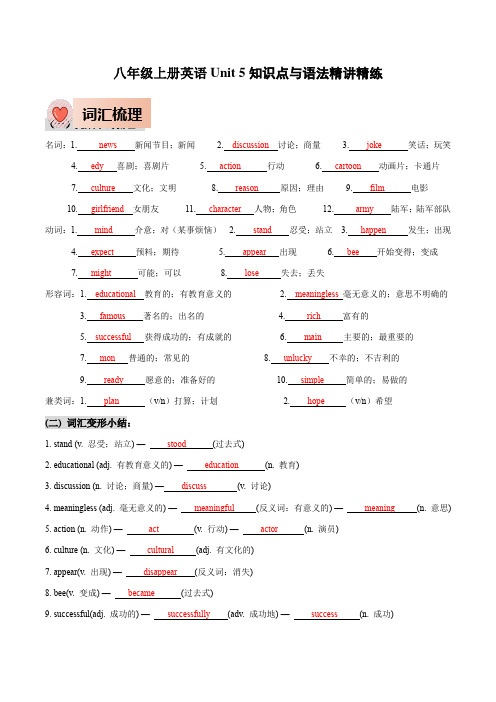
2.I don’t mind them.我不介意它们。
【用法详解】mind意为“介意;对(某事)烦恼”,其后跟动词时,要用它的动名词形式。mind doing sth意为“介意做某事”。
7.A busdisappeared(appear)in the corner when I was planning to take a taxi.
8.Guo Jingjing worked hard andbecame(bee)an excellent athlete(运动员).
9.He was sounluckythat he fell off the bike yesterday.Luckily,he wasn't hurt badly.(lucky)
八年级上册英语Unit5知识点与语法精讲精练
(一)完成单词梳理:
名词:1.news新闻节目;新闻2.discussion讨论;商量3.joke笑话;玩笑
4.edy喜剧;喜剧片5.action行动6.cartoon动画片;卡通片
7.culture文化;文明8.reason原因;理由9.film电影
10.girlfriend女朋友11.character人物;角色12.army陆军;陆军部队
be famous for
因……而出名
后接出名的原因
be famous to
为……所熟知
后常接人
【语境串记】Edisonis famous asan inventor in the world, and heis famous forhis inventions. Heis famous tothe people all over the world.爱迪生是世界著名的发明家,他因他的发明而闻名。他为全世界的人所熟知。
人教版八年级上册英语Unit1知识点梳理及语法讲义(教师版)
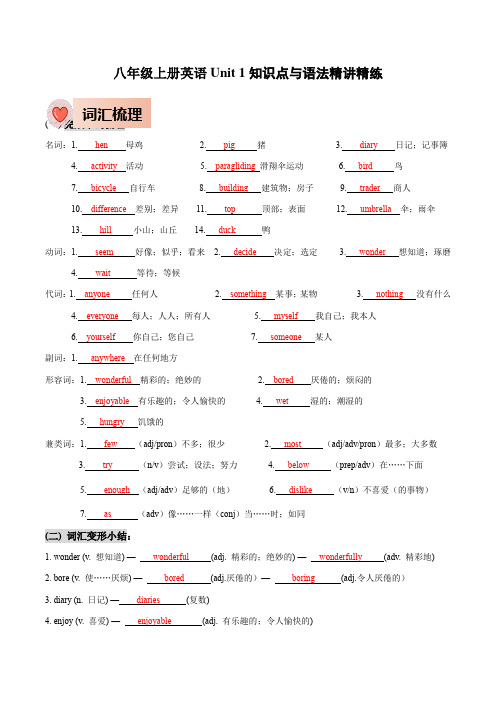
八年级上册英语Unit 1知识点与语法精讲精练词汇梳理(一)完成单词梳理:名词:1. hen母鸡 2. pig 猪 3. diary 日记;记事簿4. activity 活动5. paragliding 滑翔伞运动6. bird 鸟7. bicycle 自行车8. building 建筑物;房子9. trader 商人10. difference 差别;差异11. top 顶部;表面12. umbrella 伞;雨伞13. hill 小山;山丘14. duck 鸭动词:1. seem 好像;似乎;看来 2. decide 决定;选定 3. wonder 想知道;琢磨4. wait 等待;等候代词:1. anyone 任何人 2. something 某事;某物 3. nothing 没有什么4. everyone 每人;人人;所有人5. myself 我自己;我本人6. yourself 你自己;您自己7. someone 某人副词:1. anywhere 在任何地方形容词:1. wonderful 精彩的;绝妙的 2. bored 厌倦的;烦闷的3. enjoyable 有乐趣的;令人愉快的4. wet 湿的;潮湿的5. hungry 饥饿的兼类词:1. few (adj/pron)不多;很少 2. most (adj/adv/pron)最多;大多数3. try (n/v)尝试;设法;努力4. below (prep/adv)在……下面5. enough (adj/adv)足够的(地)6. dislike (v/n)不喜爱(的事物)7. as (adv)像……一样(conj)当……时;如同(二) 词汇变形小结:1. wonder (v. 想知道) — wonderful (adj. 精彩的;绝妙的) — wonderfully (adv. 精彩地)2. bore (v. 使……厌烦) — bored (adj.厌倦的)— boring (adj.令人厌倦的)3. diary (n. 日记) — diaries (复数)4. enjoy (v. 喜爱) — enjoyable (adj. 有乐趣的;令人愉快的)5. activity (n. 活动) — activities (复数)6. decide (v. 决定) — decision (n. 决定)7. build (v. 建造) — building (n. 建筑物;房子)8.trade (n/v贸易;买卖) — trader (n. 商人)9. difference (n. 差别;差异) — different (adj. 不同的)10. wait(v. 等候;等待) — waiter (n. 男服务员) — waitress (n. 女服务员)11. like(v. 喜欢)— dislike 反义词()【练一练】用所给词的适当形式填空1.–Mom. I plan to wash clothes by ___myself____(I) this summer vacation.Good girl! Go for it.2.Can you tell me some __differences___(different) between the two pictures?3.The students have quite a few activities (activity) after class. They can sing, dance and play basketball.4.I think it will be a very enjoyable (enjoy) trip for you to travel to Beijing.5.His cousin is a trader (trade), selling fruit and vegetables.6.The TV show is really boring (bore). I don’t want to watch it.7.As a teacher, Mr. Green always tries to make his lessons _enjoyable__(enjoy).8.This film is _wonderful___ (wonder). I like to see it very much.9.I can look after __myself____(my). Don’t worry about me.10.You must look after __yourself____(you) well while I'm away, Tom.(三) 短语攻关:go on vacation去度假stay at home 待在家里go out 出去quite a few 相当多;不少most of the time大部分时间of course当然have a good time=enjoy oneself 玩得高兴feel like 给……的感觉;感觉像take photos 拍照;照相keep a diary 写日记buy sth for sb 买某物给某人decide to do sth 决定做某事something important 重要的事find out 找出;查明in the past 在过去make a difference 产生影响;起作用enjoy doing sth喜欢做某事too many 太多arrive at/in 到达because of 因为;由于wait for 等待;等候start to do /doing sth开始做某事知识点梳理1.We took a few photos there.我们在那里拍了很多照片。
新人教版八年级上册英语单元语法及知识点归纳汇总

新人教版八年级上册英语单元语法及知识点归纳Unit1 Where did you go on vacation?【重点语法】不定代词:不指名代替任何特定名词或形容词的代词叫做不定代词。
用法注意:1. some 和any +可数名/不可数名。
some 多用于肯定句,any多用于否定句、疑问句和条件从句。
有些问句中用some,不用any, 问话者希望得到对方肯定回答。
2. 由some, any, no, every 与body, one, thing构成的复合不定代词作主语时,其谓语动词用三单。
3. 不定代词若有定语修饰,该定语要置于其后:如:something interesting【重点短语】1. buy sth for ab./ buy sb. sth 为某人买某物2. taste + adj. 尝起来……3. nothing...but + V.(原形) 除了……之外什么都没有4. seem + (to be) + adj 看起来5. arrive in + 大地方/ arrive at + 小地方到达某地6. decide to do sth. 决定做某事7. try doing sth. 尝试做某事/ try to do sth. 尽力做某事8. enjoy doing sth. 喜欢做某事9. want to do sth. 想去做某事10. start doing sth. 开始做某事=begin doing sth.11. stop doing sth. 停止做某事区分:stop to do sth. 停下来去做某事12. dislike doing sth. 不喜欢做某事14. so + adj + that + 从句如此……以至于……16. tell sb. (not) to do sth. 告诉某人(不要)做某事17. keep doing sth. 继续做某事18. forget to do sth. 忘记去做某事/ forget doing sth 忘记做过某事【词语辨析】1. take a photo/ take photos 拍照quite a few+名词复数“许多…”2. seem + 形容词看起来…... You seem happy today.seem + to do sth. 似乎/好像做某事I seem to have a coldIt seems + 从句似乎..…. It seems that no one believe you.seem like ... 好像,似乎….. It seems like a good idea.3. arrive in +大地点= get to= reach+地点名“到达......”arrive at +小地点(注:若后跟地点副词here/there/home, 介词需省略,如:arrive here; get home)4. feel like sth 感觉像…feel doing sth. 想要做某事5. wonder(想知道)+疑问词(who, what, why)引导的从句。
人教版八年级英语上册 unit6 语法+知识点

人教版八年级英语上册 unit6 语法+知识点否定结构:be not going to do / will not dozaq (won’t)will 与be going to两者都表示将来要做的动作;但还是有区别的。
一、be going to表示近期、眼下就要发生的事情;will表示的将来时间则较远一些。
如:We are going to take a walk tonight. I will visit you in a month.二、在表示将来发生的事情时;be going to用于主观判断;will则多用于客观的情况。
如:He is going to die. 他就要死了。
She will be thirteen years old. 他就快13岁了。
三、be going to含有“打算;准备”的意思;而will则没有这个意思;如:Tomorrow I am going to wake up at 7:00. Everyone will learn English.四、在有条件从句的主句中;主句中一般不用be going to;而多用will.如:如果他来了我会告诉你。
五、可表示说话人按照他的意图将要发生或进行的动作时;各有侧重:若事先计划或考虑;而是在说话的当时临时想到的意图或临时作出的决定时;则要用will。
若表示经过事先考虑好的意图时;要用be going to。
例如:I’ll answer the telephone.(事先没经过考虑)I’m going to meet him at the railway station. (已经过考虑)六、在正式的通知(如新闻媒体公布的官方消息;气象预报等)中用will。
例如:Ji’an will be cloudy with the temperature from eighteen to twenty-eight.(吉安阴;气温十八到二十八摄氏度。
人教版八年级上册英语单词讲解
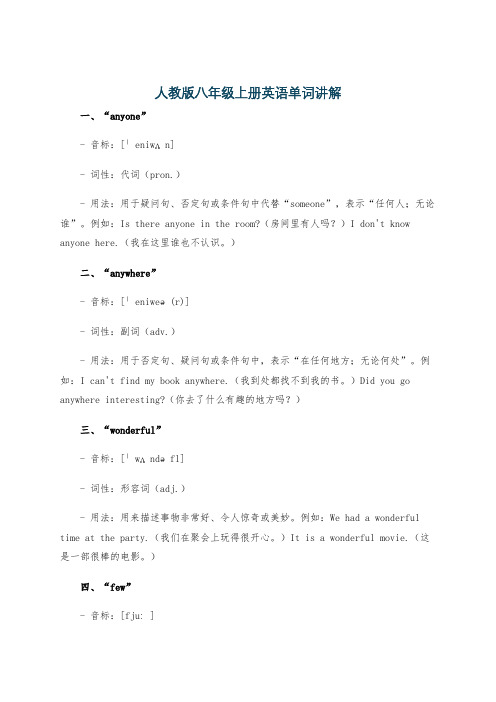
人教版八年级上册英语单词讲解一、“anyone”- 音标:[ˈeniwʌn]- 词性:代词(pron.)- 用法:用于疑问句、否定句或条件句中代替“someone”,表示“任何人;无论谁”。
例如:Is there anyone in the room?(房间里有人吗?)I don't know anyone here.(我在这里谁也不认识。
)二、“anywhere”- 音标:[ˈeniweə(r)]- 词性:副词(adv.)- 用法:用于否定句、疑问句或条件句中,表示“在任何地方;无论何处”。
例如:I can't find my book anywhere.(我到处都找不到我的书。
)Did you go anywhere interesting?(你去了什么有趣的地方吗?)三、“wonderful”- 音标:[ˈwʌndəfl]- 词性:形容词(adj.)- 用法:用来描述事物非常好、令人惊奇或美妙。
例如:We had a wonderful time at the party.(我们在聚会上玩得很开心。
)It is a wonderful movie.(这是一部很棒的电影。
)四、“few”- 音标:[fjuː]- 词性:形容词(adj.)、代词(pron.)- 用法:作为形容词时,表示“很少的;几乎没有的”,修饰可数名词复数。
例如:There are few students in the classroom.(教室里几乎没有学生。
)作为代词时,可单独使用,也表示“很少;几个”。
例如:Many people tried, but few succeeded.(许多人尝试了,但很少有人成功。
)五、“most”- 音标:[məʊst]- 词性:形容词(adj.)、副词(adv.)、代词(pron.)- 用法:作为形容词时,意为“最多的;大多数的”,可修饰可数或不可数名词。
例如:Most students like English.(大多数学生喜欢英语。
- 1、下载文档前请自行甄别文档内容的完整性,平台不提供额外的编辑、内容补充、找答案等附加服务。
- 2、"仅部分预览"的文档,不可在线预览部分如存在完整性等问题,可反馈申请退款(可完整预览的文档不适用该条件!)。
- 3、如文档侵犯您的权益,请联系客服反馈,我们会尽快为您处理(人工客服工作时间:9:00-18:30)。
Unit1 Where did you go on vacation 一.语法:(一般过去时)1.定义:表示过去发生的动作或存在的状态。
was / were +……2.结构: 主语+ am, is areV 过+……3.V.过的变化规则:①直接加ed ②以e 结尾直接加 d③以“辅+y ”结尾,变y 为i 再加ed④以“辅元辅”结尾,双写最后一个辅音字母,再加ed⑤不规则(重点)4.标志词:①yesterday (yesterday morning , the day before yesterday …..)②……ago(six hours ago, one year ago, two months ago ……)③last+时间(last year, last month ,last week ,last weekend ……)④in the past 在过去句尾⑤in those days 在那些天⑥just now 刚才⑦at that time 在那时⑧this morning 今天早上⑨over the weekend 整个周末⑩今天以前的任何时间(in 2018 ,in the 1960s ……)二.词汇:anyone ['eniw?n] pron. 任何人something ['s ?m θ??] pron. 某事物;nothing['n?θ??] pron. 没有什么n.没有everyone ['evriw?n] pron. 每人;人人someone ['s?mw ?n] pron. 某人;有人1.不定代词:指人:everyonesomeone anyone no one everybody somebody anybody nobody 指物:everything somethinganything nothing用法:①作主语,V 单②不定代词+adj. someone 变anyone ③在否定句和疑问句中:somebody 变anybody something 变anythinganywhere ['eniwe ?(r)] a dv.任何地方n.任何(一个)地方wonderful ['w?nd?fl] adj.精彩的;极好的few [fju?] adj.很少的;n.少量.quite a few 相当多;不少(后接可数名词)a few+可名复(几个) a l ittle+不可名(一点)2.few +可名复(没几个)否定little+不可名(几乎没有)否定most [m ??st] adj.最多的;大多数的most of the time 大多数时间of course [?vk??s] 当然myself [ma?'self] pron. 我自己yourself [j??'self] pron. 你自己;3.反身代词:(与主语保持一致)单数:myself, yourself, itself, himself, herself 复数:ourselves , yourselves, themselveshen [hen] n.母鸡;雌禽pig [pIg] n.猪seem [si?m] vi.似乎;好像4.seem + adj.好像……seem like 好像;似乎;be seem to do sth.好像干某事It seems/seemed +从句……bored [b??d] adj.无聊的;厌烦的;郁闷的5. bored 无聊的主语为人/ 形容人boring 令人感到无聊的主语为物/ 形容物diary ['da??ri] n.日记;日记簿keep a diary记日记activity [?k't?v?ti] n.活动;活跃decide [d?'sa?d]v.决定;选定6. decide v.? decision n. 决定decide to do sth. 决定干某事try [tra?]v.尝试;设法;努力7.try on 试穿try to do sth. 尽力干某事try doing sth. 尝试干某事try one’s best to do sth.尽某人最大的努力干某事paragliding ['p?r?ɡla?d??]n.空中滑伞feel like想要8.f eel li k e d oi ng st h.好像干某事feel like +从句bird [b??d] n.鸟;禽bicycle ['ba?s?kl] n.自行车building ['b?ld??] n.建筑物trader ['tre?d?(r)]n.商人;商船wonder ['w?nd?(r)] v.惊奇;想知道;怀疑9.wonder to do sth. 好奇干某事wonder+从句difference ['d?fr?ns] n.差异;不同10.difference n. (可名) ?different adj. 不同的be different from…… 与……不同the same as …… 与……相同top [t?p] n.顶部;顶wait [we?t]v.等;等待11.wait a moment 等一会wait for sb.等待某人umbrella [?m'brel?] n. 伞;雨伞wet [wet] adj. 湿的;雨天的because of因为;由于12. because of+短语/词组because +句子below [b?'l??] prep.低于;在...下面a d v.在下面enough [?'n?f] adj.足够的a d v.足够地;充分地13. adj.+enoughenough+n.enough to do sth. 做某事是足够……hungry ['h??ɡri]adj. 饥饿的;渴望的as [?z] conj. 如同;像...一样14.as+职业/身份作为……Eg: as a teacher 作为一名老师hill美[h?l] n. 小山;丘陵;斜坡;山冈duck [d?k] n. 鸭肉;鸭dislike [d?s'la?k]v.不喜欢;厌恶n.不喜爱;厌恶;反感15.like v.喜欢?dislike v.不喜欢love v.爱? hate v.憎恨to do sth.like/love/hate doing sth.dislike doing sth.(不喜欢干某事)have a good time=enjoy oneself=have fun玩得痛快Central Park 中央公园Tian'anmen square 天安门广场the Palace Museum 故宫博物院Unit2 H ow often do you exercise?一.语法:(频度副词和次数的表达)(一).频度副词always > usually > often>sometimes > seldom > hardly ever > never 100% 80% 60% 30% 10% 5% 0%用法:1.常用于一般现在时态中主+频+实V.(频不影响主谓关系)2.位置主+情/系/助+频+实V.(二)次数的表达once (一次) twice (两次) three times(三次)four times(四次)基数词+times注意:①当次数划线提问时用How often ……?②every +时间名词划线提问也用How often ……?(三)与How 有关的特殊疑问词/词组How many +可名复……? 询问数量How much +不可名…….? 询问数量(How much……?询问价钱)How old …….?=what’sthe age of sb.? 询问年龄How tal l……? 询问身高How long 问段时间/长度How far 问距离How soon 问将来的时间How often 问次数How about doing sth.?= What about doing sth.? 征求意见二.词汇:housework ['has w ??k] n.家务劳动1. housework 不可名homework 不可名do one’s housework/homeworkdo 为实义动词变否定句时为:don’t do one’s housework/homeworkever ['ev?(r)] adv.曾经;在任何时候hardly ['hɑ?d li] adv.几乎不;简直不;刚刚(表否定)hardly ever很少;几乎从不;难得2. 困难的=difficult?easy 容易的hard adj.坚硬的?soft 软的adv.努力地(work hard 努力工作)hardly adv. 几乎不once [w?ns] adv.一次;曾经twice [twa?s] adv.两倍;两次Internet ['?nt?net] n.因特网3. on the Internet 在网上surf the Internet 上网program ['pr??ɡr ? m] n.节目;程序;课程;节目单full [f?l] adj.满的;充满的;完全的4.be full of…… 充满…… ;装满……be filled with……swing [sw??]n.摇摆;秋千v.摇摆;旋转swing dance摇摆舞body ['b?di] n.身体maybe ['me?bi] adv.或许;也许;可能5. maybe =perhaps 用在句首也许may be 用在句中可能是……least [li?st] adj.最小的;最少的at least至少junk n.垃圾;废旧杂物junk food n.垃圾食品;无营养食品coffee ['k?fi] n.咖啡;咖啡色health [helθ]n.健康;人的身体或精神状态6. health n. ? healthy adj. 健康的keep healthy= stay healthy.保持健康healthy food 健康食品result [r?'z?lt] .结果;后果percent [p?'sent] adj.百分之...的7.基数词+ percent of……百分之……谓语用单/复看of 之后的名词online [??n'la?n] adj.在线的a d v.在线地television ['tel?v??n] n.电视机;电视节目although [??l'e??] conj.虽然;尽管;然而;可是8.although = though 表转折although/though 不能与but 连用through [θru?] prep.穿过;凭借;一直到9. through 指从内部穿过或者头顶有物体遮挡through the forest 穿过森林go through 经历;经受through the window 透过窗户get through 通过than [e?n] conj.比less [les] adj.更少的;较少的more than超过;多于;不仅仅;非常less than不到;少于mind [ma?nd] .头脑;想法;意见;心思10. mind doing sth. 介意干某事mind not doing sth. 不介意干某事make up one’s mind to do sth.下定决心干某事such [s?t?] adj.这样的;如此的11. such+a/an +adj.+可名单so + adj.+ a/an +可名单such as例如;诸如12. such as +短语/单独的名词For example ,+句子(举例说明)together [t?'ɡee?(r)] adv.共同;一起die [da?]v.死;枯竭;消失point [p??n t] n.看法;要点;重点;小数点;目标;分数writer ['ra?t?(r)] n.作者;作家dentist ['dent?st] n.牙科医生13.go to the dentist.看牙医magazine ['m?ɡ?z i?n] n.杂志however [ha?'ev?(r)] adv.然而;无论如何;不管多么14. However 表转折,单独使用but +句子表转折although/though 不能与but 连用almost ['??lm??st] adv.几乎;差不多none [n?n] pron.没有人;没有任何东西,毫无15. none 指人/物none of ……V单/复表否定no one 只指人V单nobody 只指人V单Unit3 I'm more outgoing than my sister.一.语法:(adj.&adv.原级和比较级) 1.adj. & adv.使用原则①系+形②半系+形(半系V.有:feel ,taste,keep,get,become,smell,look sound,等)③形+名④动+副/副+动2. adj. & adv的原级①……as+原级as……否定句? so+原级as……②so+adj.+a/an+名单③such+a/an+adj.+名单④倍数+as+原级as……⑤very,quite,too,so +原级3.adj.&adv.比较级(定义:两个同类事物之间的比较)①主+谓+比+than+被比较部分②The+比……,the+比……(越……越……)③……比and比……/more and more+原级……(越来越……)④主+谓+the+比+of the two +名复(两个中最……)⑤much ,a little , far ,even ,a lot ,any等+比较级4.adj.&adv.等级的变化规则①直接加~er, ~est ②以e结尾,直接加~r, ~st③以“辅元辅”结尾,双写,加~er,~est④以“辅+y”结尾,变y为i,加~er,~est⑤多音节more+原级,the most+原级⑥不规则变化二.词汇:outgoing ['a?tɡ????] adj.外向的better ['bet?(r)] adj.更好的;较好的a d v.更好地1.good-better-best well-better-besthad better do sth. 最好干某事had better not do sth.最好不要干某事loud [la?d] adj. 大声的;a d v.大声地;响亮地loudly ['la?dli] adv.大声地;高声地;花俏地quietly ['kwa??tli] a d v.安静地;悄悄地;平静地2.quiet adj.安静的be quiet=keep quiet 保持安静hard-working [hɑ?d'w??k??]adj.勤勉的;努力工作的competition [?k?mp?'t??n] n.竞争;比赛fantastic [f?n't?st?k] adj.极好的;了不起的which adj.哪一个;哪一些pron.哪一个;哪些clearly ['kl??li] adv.清楚地;显然地win [w?n] v.赢;赢得;获胜;获得n.胜利3. win (won) +项目赢得某项比赛beat (beat)+人/团队打败某人/团队though conj.虽然;尽管;a d v.不过4.although = though 表转折although/though 不能与but 连用even though =even if 即使talented ['t?l?nt?d] adj.有才能的;有天赋的5. talent n. 才能;天赋be talented in ……擅长…… do well in ……be good at……truly ['tru?li] adv. 真实地;真诚地;正确地care [ke?(r)] v. 关心;担忧;照顾;在乎care about关心serious ['s??ri?s] adj.严肃的;严重的;庄重的6.take……seriously 认真对待…….be serious about sb/sth. 对某人/某事当真be serious about doing sth. 对某事当真mirror ['m?r?(r)] n.镜子;反映kid n. 孩子,小孩as long as只要necessary ['nes?s?] adj.必要的;必然的be different from和...不同7.the same as 和……相同both [b??θ]adj. 两者都pron.两者8. both……and…… ……和……Both of…… 两者都all 指三者或者以上都……all of …… 所有的都……bring out拿出;推出9. bring out the best /worst in sb.给某人展现出最好的一面/最差的一面grade n. 成绩should [??d] aux.应该;可能;应当;将要10. should 情态动词?否定形式shouldn’t 不应该the same as与...同样的saying n. 名言reach [ri?t?]v.到达;伸出;延伸;(伸手)去够11.reach for 伸手取……reach v.到达reach +地点get to +地点arrive in/at +地点hand n.援手touch [t?t?] vt. 触摸;感动heart [hɑ?t] n. 心脏;内心12.touch one’s heart 感动某人fact [f?kt] n. 事实;真相;实际in fact事实上;实际上;确切地说break [bre?k] v.打碎;折断;违背;解决;中断arm n. 胳膊laugh [lɑ?f]v.发笑;笑;嘲笑n.笑声;笑;笑料ugh at sb. 嘲笑某人share [?e?(r)] vt.分享,共享;分配;共有14. share sth. with sb. 和某人分享某物share in sth. 共同分担某事similar ['s?m?l?(r)] adj. 类似的be similar to类似于;与...相似primary ['pra?m?ri] adj.最初的,最早的primary school 小学15. kindergarten 幼儿园primary school 小学middle school 初中high school 高中collage 综合大学university 大学information [??n f?'me??n] n.信息;情报;资料;通知16. information 不可名Unit4 What's the best movie theater? 一.语法:(adj.&adv.最高级)1.定义:表示三者或以上同类事物之间的比较①主+谓+the+最高级+范围②主+谓+比+than+any other+名单+范围2.结构③One of +the +形高名复is……④ the +序数词+形高名单is ……⑤主+谓+the +最高级+名词+I have ever ……3.变化规则①直接加~er, ~est②以e结尾,直接加~r, ~st③以“辅元辅”结尾,双写,加~er,~est④以“辅+y”结尾,变y为i,加~er,~est⑤多音节more+原级,the most+原级⑥不规则变化good/well-better-bestbad/badly-worse-worstmuch/many –more-mostlittle –less-leastfar-farther/further-farthest/furthestold-older/elder-oldest/eldest二.词汇:theater ['θ??t?] n.剧场;电影院;戏院comfortable ['k?mft?bl] adj.舒适的;充裕的comfortably ['k?mft?bli] a d v.舒服地;容易地;充裕地seat [si?t] n.座位;1.have a seat =sit down 坐下sit v.坐(sat)screen [skri?n] n.屏幕;银幕close [kl?s]v.关;合拢;不开放;停业2.be close to …… 离……近close v.关? open v. 打开ticket n.票worse [w??s] adj.更坏的;更差的worst [w??st] adj.最坏的;最差的cheaply ['t?i?pli] adv.廉价地;粗俗地3. cheap adj.便宜的? expensive/dear adj.昂贵的song [s??] n.歌曲;歌唱choose [t?u?z]v.选择;决定5.choose-chose-chosencarefully ['ke?f?li] adv.小心地,认真地6.careful adj. ? carefully adv.careless adj. ? carelessly adv. 粗心地reporter [r?'p??t?(r)] n.记者so far到目前为止;迄今为止fresh [fre?] adj.新鲜的;清新的service ['s??v?s] n.服务pretty ['pr?ti] adv.相当地adj.漂亮的menu ['menju?] n.菜单act [?k t] v.行动;表演7.actor n.男演员actress n. 女演员meal [mi?l] n.一餐;膳食creative [kri'e?t?v] adj.创造的,创造性的;performer [p?'f??m?(r)] n.表演者;执行者talent ['t?l?nt] n.天赋;才能,才艺;8. talented adj. 有才能的;有天赋的common ['k?m?n] adj.常见的;共同的;普通的have…in common有相同特征magician [m?'d???n] n.魔术师;术士all kinds of各种各样;各种类型9. a kind of…… ……的一种many kinds of…… 许多种……different kinds of …… 不同种……kind of +adj.=a little+adj. 有点儿……beautifully ['bju?t?fli] adv.美丽地;完美地;be up to是…….的职责;由…….决定role [r??l] n.作用;角色play a role发挥作用;有影响10. play a role in doing sth. 在做某事方面有发挥着作用winner ['w?n?(r)] n.获胜者prize [pra?z] n.奖品;奖金11. the first prize 一等奖get a very good prize 得到好奖品everybody ['evrib?di] pron.每人;人人make up编造example [?ɡ'zɑ?mpl] n.例子;榜样for example例如12.For exampl e,+句子(举例说明)such as +词组(列举)poor [p??(r)] adj.可怜的;贫穷的13.poor adj.穷的? rich adj. 富有的the poor 穷人the rich 富人the+adj. 表示一类人seriously ['s??ri?sli] 严重地,严肃地take…seriously认真对待give [ɡ?v]v.给;赠予;送14.give sb.sth.=give sth. to sb.给某人某物crowded ['kra?d?d] adj.拥挤的15.crowd v. 拥挤Unit6 I'm going to study computer science. 一.语法:(一般将来时)(一)定义:表示将要发生的动作或存在的状态①主+be going todo +……(二)结构②主+will do +……(三)标志词:1.tomorrow (the day after tomorrow ; tomorrow morning)2.next+时间名词(next year, next month next week)3. in +段时间(in three days ;in two hours)4.in the future 在将来5.今天以后的任何时间6. before long 不久以后7.from now on 从现在开始8.soon 不久二.词汇:grow up 长大成长computer programmer 计算机管理员cook [k?k] vt. 烹调,煮,烧,做(饭):vi. 烹饪,做饭,烧菜;doctor ['d?kt?(r)]医生engineer [end??'n?r] 工程师violinist [?va??'l?n?st]小提琴手pianist ['p??n?st] 钢琴家scientist['sa??nt?st]科学家 1.driver ['dra?v?] n. 驾驶员;驱动程序;起子;传动器pilot ['pa?l?t] 飞行员be sure about 确信1. be sure about /ofsth. 对……有把握be sure to do sth .一定会干某事be sure +从句确信……make sure 确保college ['kɑ?l?d?] 大学university [?ju?n?'v??rs?t i] 大学,高等学府2.kindergarten 幼儿园primary school 小学middle school 初中high school 高中collage 综合大学university 大学team [tim](一)队(人);(一)组(人)education [?ed?u'ke??n] n. 教育3. educational adj. 有教育意义的;受教育的get education 受教育medicine ['medsn]药,医学London ['l?nd?n] n.伦敦article ['ɑ?rt?kl]文章,论文send [send] 邮寄,发送4.send—sent-sentsend sb.sth.=send sth. to sb. 把某物发给某人send for 派(人)去请send away 开除;赶走resolution [?rez?'lu??n] 决心,决定5.. make resolution 下决心foreign ['f??r?n] adj.外国的6.. foreigner n.外国人able [?eb?l] 能够be able to 能够做某事7. be able to do sth. 能够做某事be able to 强调有能力干好某事question ['kw?st??n] n.问题8.question 可名指可以回答的问题problem 不可名指那已解决的麻烦ask the question 问问题solve the problem 解决问题the answer to th e question 问题的答案meaning ['min??] n.意义;;adj. 意味深长的v.意味;意思是9. What do you mean by “A”?mean v.意义What does “A”mean?What’s the meaning of “A”?“A”的意义是什么?meaningful adj. 有意义的? Meaningless adj. 无意义的discuss [d??s k?s] 讨论,商量10. discuss to do sth. 讨论干某事promise [?prɑm?s] 承诺,诺言11. make promise 许诺promise to do sth.承诺干某事beginning [b??ɡ?n??]开头,开端at the beginning of 起初improve [?m?pruv] 改进,改善selfimprovement [self?mp'ru?vm?nt]自我改进,自我提高write down 写下physical ['f?z?kl]身体的themselves [e?m's?lvz] 他们自己have to do with关于;与……有关系take up学着做;开始做hobby ['hɑ?bi]业余爱好weekly['wikli] adj. 每周的;;n. 周刊a d v.每周一次;逐周school work 学校作业agree[?'ɡri] vt. 同意;赞成;承认vi. 同意;意见一致agree with 同意12. agree with sb同意某人agree to sth. 赞同某一计划或建议agree on (doing)sth. 双方在某事上意见一致agree to do sth. 赞同做某事同义own [o?n] 自己的,本人的,拥有13. one’s own +名词某人自己的……on one’s own =alone 独自personal ['p??rs?n l]个人的,私人的relationship [r?'le??n??p] 关系Unit 7 Will people have robots?一.语法:(一般将来时)(一)定义:①表示将要发生的动作或存在的状态②用be doing 中的短暂性动词可表将来①主+be going todo +……(表近期的打算) (二)结构②主+will do +…… (表长远的)③ be doing (仅限于短暂性动词)常见的有:go ,come arrive ,leave (三)标志词:1.tomorrow (the day after tomorrow ; tomorrow morning)2.next+时间名词(next year, next month next week)3. in +段时间(in three days ;in two hours)4.in the future 在将来5.今天以后的任何时间6. before long 不久以后7.from now on 从现在开始8.soon 不久二.词汇:paper['pe?p?r] n. 纸1.paper n.纸不可名( a piece of paper 一张纸)paper n. 试卷可名pollute[p?'lu?t]v.污染pollution [p?'lu??n] n. 污染;污染物prediction[pr?'d?k?n] n.预测future ['fju?t??r]n. 未来2. in the futu re 在将来;在未来in future 今后;以后environment [?n'va?r?nm?nt] n.环境3.protect th e envi ron men t 保护环境planet ['pl?n?t] 行星earth[??rθ]n.地球;泥土3.on the earth 在地球上save the earth 拯救地球世界上独一无二的事物前必须用the如:the sun the world the moon 等plant [pl?nt] v.种植,n. 植物part [pɑ?rt] v.参加,部分play a park 参与(某事)5. play a park in doing sth. 参与做某事peace [pi?s] n.和平? peaceful adj. 和平的sea [si] n. 海;海洋;许多;大量4.at sea 在海上by sea 坐船in the sea 在海里sky[ska?] 天空astronaut['?str?n??t]宇航员apartment[?'pɑ?rt m?nt] 公寓房间rocket ['rɑ?k?t] 火箭;space[spe?s] n.空间;太空.space station 太空站human ['hju?m?n] n.人的;n.人;人类5.human being 人复数:human beings=humans person 指个体的“人” 复数:personspeople 指集体人们单复同形民族复数:peoplesservant['s??rv?n t] n. 仆人dangerous ['de?nd??r?s] adj.危险的7. dangerous adj.危险的? danger n.危险be in great danger 处于极大的危险中already[??l'redi] adv.已经8. already 用于句中否定句/疑问句?变yet 用于句末factory['f?ktri] 工厂over and over again 多次;反复地believe [b?'li?v] v.相信9. believe sb.相信某人believe in sb.信任某人disagree [?d?s?'ɡri?] v.不同意10. disagree v. 不同意? agree v. 同意disagree with sb.不同意某人的意见even['i?vn]甚至;愈加11.even +比较级hundreds of 许多;大量;成百上千12.概数词:hundred ,thousand , million , billion基数词+概数词用法:概数词s+ ofshape [?e?p] 形状13. in the shape of 以……的形状fall [f??l]倒塌;跌倒fall-fell-fallenfall down 突然倒下;跌倒;倒塌14. fall asleep 入睡fall over 被……绊倒fall in love 爱上…… fall behind 落后;下降fall =autumn n. 秋天inside['?n'sa?d] n. 里面;内部adj. 里面的;内部的;秘密的a d v.在里面prep. 少于;在…之内look for 寻找;寻求15. look for 寻找表动作find 寻找表结果find out 查明弄清楚possible ['pɑ?s?bl] 可能的impossible[?m'pɑs?bl] adj. 不可能的;不真实的n. 不可能;不可能的事side [sa?d] n. 方面;侧面;旁边vi. 支持;赞助;偏袒adj. 旁的,侧的v t. 同意,支持16.on one side of…… 在……的一边on both sides of…… 在……的两边side by side 并排;并肩word[w??rd]n.单词;probably ['prɑ?b?bli] adv.大概;或许;很可能during['d?r??]prep. 在…的时候,在…的期间holiday ['hɑ?l?de?] n.假日17. holiday 休假(指法定节假日)vacation 假期(工作或学习中一段很长时间的休息)Unit 9 Can you come to my party? 一.语法:(情态动词)(一).常见的情态动词有:can -------- could (能;可以) will--------would(将要)may--------might (也许) shall (将要;必须;应该)should(应该) ought to (应该)had better (最好)must(必须)need (需要)have to (不得不) mustn’t(禁止)needn’t(不必)(二).情态动词的用法1.Must I ……? 肯定回答:yes , you must否定回答:No,you needn’t /No,you don’t have to 2.表推测:must ,will , would , ought to , should , can , could , may , might最强最弱①表询问请求用于第一、三人称中3.shall ②表决心、警告、命令用于第二人称中4.mustn’t 以为“禁止”5. had better do sth.had better not do sth.6. Would you please+ V原……?Could you please+ V原……?7.Would you like……? 肯定回答:Yes, please/ Yes, I ‘d love to .否定回答:No, thanks二.词汇:prepare [pr?'per]v.预备;准备preparation [?prep?'re??n]准备,准备工作prepare for 为……准备1. prepare to do sth. 准备去做某事be/get ready to do sth.prepare for(doing)sth. 为……做准备be/get ready for sth.prepare sb. sth.=prepare sth. for sb. 给某人准备某物exam[?ɡ'z?m]考试flu[flu] n. 流感2.have a flu 患流感available[?'ve?l?bl] 可得到的;有空的;another time 其他时间,别的时间until [?n't?l]conj. 在…以前;直到…时prep. 在…以前;到…为止3.not……until…… 直到……才……hang [h??]悬挂;(使)低垂hang out 常去某处;泡在某处4.hang out with sb. 和某人闲逛catch[k?t?] 赶上;抓住;捕捉5.catch up with sb. 赶上某人delete [d?'li?t]删除glue[ɡlu]vt. 粘合;似胶般固着于n. 胶;各种胶合物invite [?n'va?t] 邀请invitation [??n v?'te??n]邀请;邀请函6.invite sb.to d o s th.邀请某人干某事invi te sb. to sp. 邀请某人去某地invite sb.for sth. 为某事邀请某人turn down an invitation 拒绝邀请accept an invitation 接受邀请accept[?k'sept] v. 接受;7. accept 表示主动而且高兴地接受receive 表示被动的接受refuse [r?'fju?z] v.拒绝8. refuse to do sth. 拒绝干某事the day before yesterday 前天the day after tomorrow 后天weekday['wikde] n. 平日,工作日9.weekend n.周末on the weekend=on weekends 在周末look after 照顾,照料turn down减小,关小,调低reply [r?'pla?] 回答,回复10. reply in writing 书面回复reply to sb. 回复某人forward['f??rw?r d] 转交;发送,向前的look forward to 盼望,期待11. look forward to doing sth. 期待干某事print [pr?nt] n. 印刷业;印花布;;印章;印记vt. 印刷;打印;刊载;sad[s?d] adj. 难过的;悲哀的goodbye[g?d'ba?] int. 再见take a trip 去旅行glad [ɡl?d] adj. 高兴的;乐意的;vt. 使高兴without[w?'θa?t] prep. 没有;adv. 户外;在外面;n. 外部;外面12. without ? with介词介+doingsurprised[s?'pra?zd] adj. 感到惊讶的,出人意料的v.使惊奇12. surprised 感到惊讶的修饰人/主语是人surprising 令人惊讶的修饰物/主语是物to one’s surprise 使某人吃惊的是……in surprise 吃惊地;惊奇地hear from 收到......来信hear sb. do sth. (全过程)13.hear v. 听(表结果)hear sb. doing sth.(一部分)hear –heard-heardhear of /about 听说housewarming ['ha?s,w?rm??] n. 乔迁庆宴opening['o?pn??]开幕式,落成典礼14,。
